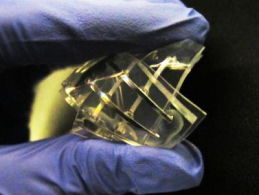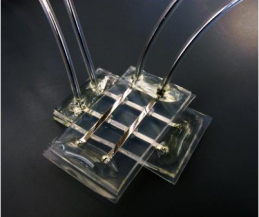 |
| A memory device with the physical properties of Jell-O that functions well in wet environments (credit: Michael Dickey, North Carolina State University) |
North Carolina State University researchers have developed a soft memory device design that functions well in wet environments and has memristor-like characteristics, opening the door to new types of smart biocompatible electronic devices.
A memristor (“memory resistor”) is an electronic device that changes its resistive state depending on the current or voltage history through the device.
The ability to function in wet environments and the biocompatibility of the gels mean that this technology holds promise for interfacing electronics with biological systems and medical monitoring, such as cells, enzymes or tissue.
The device is made using a liquid alloy of gallium and indium metals set into water-based gels. When the alloy electrode is exposed to a positive charge, it creates an oxidized skin that makes it resistive to electricity (a “0″ state).
When the electrode is exposed to a negative charge, the oxidized skin disappears, and it becomes conductive to electricity (a “1″ state).
Ref.: Orlin D. Velev, et al., Towards All-Soft Matter Circuits: Prototypes of Quasi-Liquid Devices with Memristor Characteristics, Advanced Materials, 2011; [DOI: 10.1002/adma.201101257]
Original Article by the Editor of Kurzweilai.net


No comments:
Post a Comment